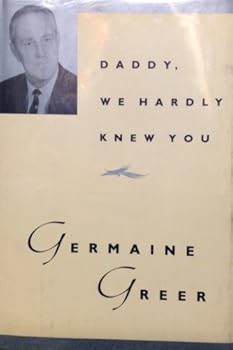Daddy, We Hardly Knew You
Select Format
Select Condition 
Book Overview
Germaine Greer's The Female Eunuch was a central book in the early feminist movement and established its author as a brilliant--and wildly controversial--figure. Her latest book is her most personal, an acclaimed account of her search to know her father--and, by extension, herself. What she learned changed her views on her mother, men, truth and loyalty, family and love.
Format:Hardcover
Language:English
ISBN:0394583132
ISBN13:9780394583136
Release Date:February 1990
Publisher:Alfred A. Knopf
Length:311 Pages
Weight:1.55 lbs.
Dimensions:1.2" x 6.9" x 9.1"
Customer Reviews
1 rating
ONLY CONNECT
Published by Thriftbooks.com User , 16 years ago
A very unusual, and in my own opinion absolutely absorbing, narrative by a writer of exceptional talent. Germaine Greer was driven (not to say well paid) to root out the secrets that underlay her father's strange personality. He had died when she was young, and in such time as they shared he had been putting up some sort of pose or front that she could never penetrate or fathom, then or later. He died in generally sound bodily health although suffering from some variety of degenerative brain disorder; but long before that set in it was obvious that there was something seriously not right with him. Germaine Greer's search for her father's identity starts with the assumption, hardly an unreasonable one, that if she was going to find out anything about him she would at least find it indexed under `Greer'. Only when the truth finally dawns that even that is not so does the rest of the bizarre jigsaw at last fit together. Her search takes her across a great deal of the globe - Tasmania, mainland Oz, Italy, India, Malta and even fabled Cambridge. The general plan of the book seems fairly clear, and it appears to consist of hanging lengthy essays on a variety of subjects, sometimes only distantly related to the overall theme, on the main connecting cable of the narrative. The plan works not too badly by and large, but probably not as well as it ought to have. I'd say the book starts well and ends well - in fact it ends spectacularly well - and that is nine tenths of the battle. It is in some of the middle chapters that I sense a loss of concentration and focus. The successful and welcome digressions, for me, were those in which Dr Greer was advancing a strong and distinctive message of her own, say a feminist message or an environmental commentary. I found her interesting and convincing when discussing women's conditions in wartime Malta, but a lot less so when she was just being a run-of-the-mill general historian of that episode. I was very interested in her analytic social history of Tasmania, a matter she has something to say about, but I thought that her chapter at the Cambridge college high table wearing her doctoral gown and hobnobbing with the Master of this and Professor of that descended into twittering. Loss of concentration even shows through as bad proof-reading in these less than wonderful sequences: how about `If they are treated as a rabble by commanding officers who understand nothing of their background and make no attempt to put them in the picture they will be more prepared to kill him than to die for him' (p144) for instance? Or the Spitfire on p188 with `one engine aflame'? How many engines did this particular Spitfire have? Nevertheless the author gets her formidable focus realigned as her investigations come to their remarkable and even exciting conclusion, all the better for the abortive findings, cleverly told and skilfully paced in the story-line, that precede it. Quite apart from the narrative aspects, there is some well





